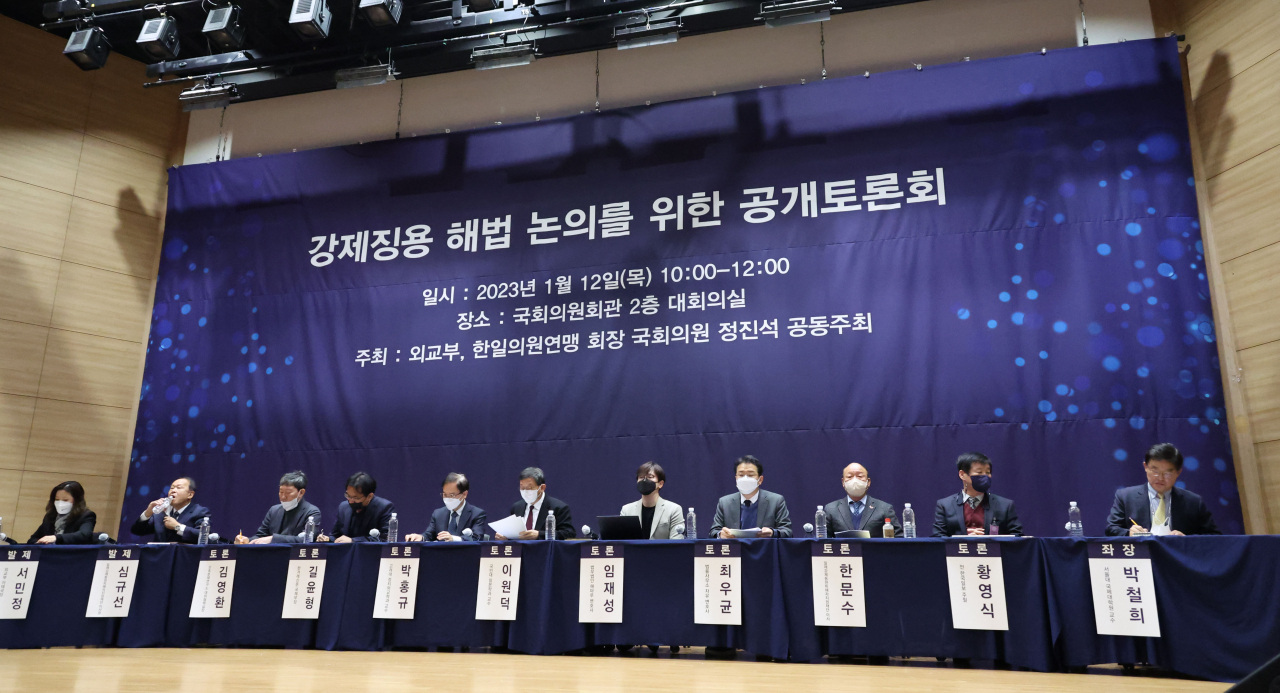Key takeaways from contentious deal on forced labor
By Choi Si-youngPublished : Jan. 23, 2023 - 14:00

After roughly a four-year struggle, South Korea and Japan are nearing a compromise on making amends to Koreans forced into labor by Japanese companies during World War II. The dispute -- which Seoul’s top court said in October 2018 was Tokyo’s fault -- strained bilateral ties as Japan refused to honor the ruling and pay damages to the victims. Tokyo claims a 1965 treaty that normalized relations with Seoul following its colonial rule of the Korean Peninsula already settled the issue.
Currently, Korea is seeking to pay victims itself through a fund, acknowledging that involving Japan as directly and deeply as victims want in the process is not realistic.
Here are answers to some of resurfacing questions about why the two countries are still at odds over the issue and what the future could hold for them.
aaa
What is the 1965 agreement?
Signed on June 22, 1965, the Treaty on Basic Relations between the Republic of Korea and Japan established diplomatic relations so South Korea and Japan could start working as equal partners on the international stage. Seoul received $800 million in economic aid as part of the deal, and Tokyo has cited that as evidence of a settlement terminating any and all claims South Korean victims affected by the colonization could file against Japan. Korea used the aid to grow companies and build infrastructure.
But experts disagreeing with Japan say the treaty had not discussed wartime abuses, such as forced labor, meaning those victims maintain the right to file claims. In 1991, Japan’s Foreign Ministry found that such Korean victims had that right, though top officials there have since routinely and openly contended otherwise.
“That is a contradiction Seoul should use to negotiate better with Tokyo,” according to Yuji Hosaka, a naturalized Japanese-born Korean known for his decades-old campaign on managing bilateral ties. The “economic aid” also cannot replace “damages” victims are still seeking, because the two terms are fundamentally different by nature, experts say.
aaa
What compromise is on the table?
Korea is seeking to have local companies that benefited economically from the 1965 treaty compensate victims, while awaiting Japan’s “sincere response,” which Seoul’s Foreign Ministry says is being debated between the two neighbors. The discussion, a senior ministry official says, involves Japan’s “apology and contribution to compensation,” though Tokyo would almost certainly work from every angle to water down the two conditions as it maintains the issue was already settled.
It is unclear when Seoul and Tokyo would actually reach a joint decision, but the two are expected to put behind the longtime historical dispute in the months to come before the year runs out, potentially with a Korea-Japan summit bookending the marathon negotiations. President Yoon Suk Yeol, who took power in May last year, is looking for better ties to bolster a three-way military coalition that includes the US to counter North Korea, South Korea’s greatest security threat.
aaa
Where is the biggest holdup?
Victims say the Korean government is being overly soft on a settlement because Japan is essentially walking away with what it has always wanted: no direct apology or compensation. Worse for victims, Japan is demanding the Japanese firms Korea’s top court held liable for damages not be asked to reimburse the Korean government once it indemnifies the Korean victims with Korean company funds.
“This is not just a civil case; it’s about setting the record straight,” said Kim Yeong-hwan, chief of the external relations team at the Center for Historical Truth and Justice, the most vocal local group whose stated mission is reducing the gap in the way South Korea and Japan understand their shared history.
If Korea uses local companies’ money and waits for Japan to do the same, that would pose as an unwarranted exoneration because it had been Japanese firms held liable for damages by Korea’s top court, according to Kim.
Lim Jae-sung, the attorney who won the case for Korean victims in the 2018 Supreme Court ruling, stresses that victims have long wanted an admission of wrongdoing and apology from Japan -- the two conditions still absent from the compromise the Korean government is seeking. Seoul’s chief negotiator said last week that she expects the “sincere response” currently under debate between the two countries to be the closest reflection of victims’ demand.
“We don’t need a rushed decision,” Lim says, asking the government to hold more public debates. The last two-hour hearing on Jan. 12 had descended into chaos as victims were given less than 10 minutes to speak their minds.









![[Kim Seong-kon] Democracy and the future of South Korea](http://res.heraldm.com/phpwas/restmb_idxmake.php?idx=644&simg=/content/image/2024/04/16/20240416050802_0.jpg&u=)










![[Today’s K-pop] Zico drops snippet of collaboration with Jennie](http://res.heraldm.com/phpwas/restmb_idxmake.php?idx=642&simg=/content/image/2024/04/18/20240418050702_0.jpg&u=)